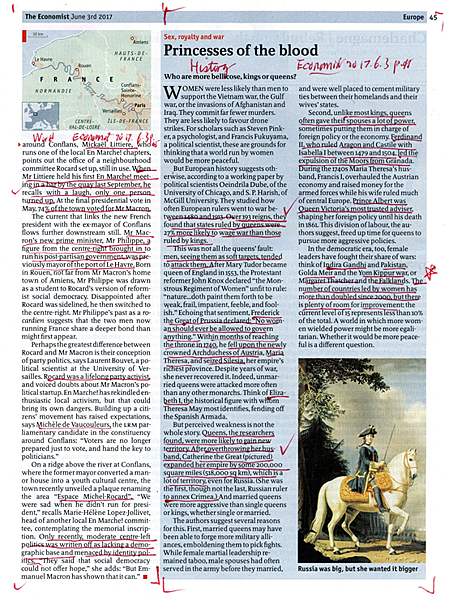Princesses of the Blood: Sex, Royalty and War
Economist, June 3, 2017
accessed June 3, 2017
● 歷史學家發現---從1480年到1913年歐洲國家統治者中皇后發動戰爭的次數比國王高27%
林中斌2017.6.3


WOMEN were less likely than men to support the Vietnam war, the Gulf war, or the invasions of Afghanistan and Iraq. They commit far fewer murders. They are less likely to favour drone strikes. For scholars such as Steven Pinker, a psychologist, and Francis Fukuyama, a political scientist, these are grounds for thinking that a world run by women would be more peaceful.
But European history suggests otherwise, according to a working paper by political scientists Oeindrila Dube, of the University of Chicago, and S. P. Harish, of McGill University. They studied how often European rulers went to war between 1480 and 1913. Over 193 reigns, they found that states ruled by queens were 27% more likely to wage war than those ruled by kings.
This was not all the queens’ fault: men, seeing them as soft targets, tended to attack them. After Mary Tudor became queen of England in 1553, the Protestant reformer John Knox declared “the Monstrous Regiment of Women” unfit to rule: “nature...doth paint them forth to be weak, frail, impatient, feeble, and foolish.” Echoing that sentiment, Frederick the Great of Prussia declared: “No woman should ever be allowed to govern anything.” Within months of reaching the throne in 1740, he fell upon the newly crowned Archduchess of Austria, Maria Theresa, and seized Silesia, her empire’s richest province. Despite years of war, she never recovered it. Indeed, unmarried queens were attacked more often than any other monarchs. Think of Elizabeth I, the historical figure with whom Theresa May most identifies, fending off the Spanish Armada.
But perceived weakness is not the whole story. Queens, the researchers found, were more likely to gain new territory. After overthrowing her husband, Catherine the Great (pictured) expanded her empire by some 200,000 square miles (518,000 sq km), which is a lot of territory, even for Russia. (She was the first, though not the last, Russian ruler to annex Crimea.) And married queens were more aggressive than single queens or kings, whether single or married.
The authors suggest several reasons for this. First, married queens may have been able to forge more military alliances, emboldening them to pick fights. While female martial leadership remained taboo, male spouses had often served in the army before they married, and were well placed to cement military ties between their homelands and their wives’ states.
Second, unlike most kings, queens often gave their spouses a lot of power, sometimes putting them in charge of foreign policy or the economy. Ferdinand II, who ruled Aragon and Castile with Isabella I between 1479 and 1504, led the expulsion of the Moors from Granada. During the 1740s Maria Theresa’s husband, Francis I, overhauled the Austrian economy and raised money for the armed forces while his wife ruled much of central Europe. Prince Albert was Queen Victoria’s most trusted adviser, shaping her foreign policy until his death in 1861. This division of labour, the authors suggest, freed up time for queens to pursue more aggressive policies.
In the democratic era, too, female leaders have fought their share of wars: think of Indira Gandhi and Pakistan, Golda Meir and the Yom Kippur war, or Margaret Thatcher and the Falklands. The number of countries led by women has more than doubled since 2000, but there is plenty of room for improvement: the current level of 15 represents less than 10% of the total. A world in which more women wielded power might be more egalitarian. Whether it would be more peaceful is a different question.


 留言列表
留言列表


